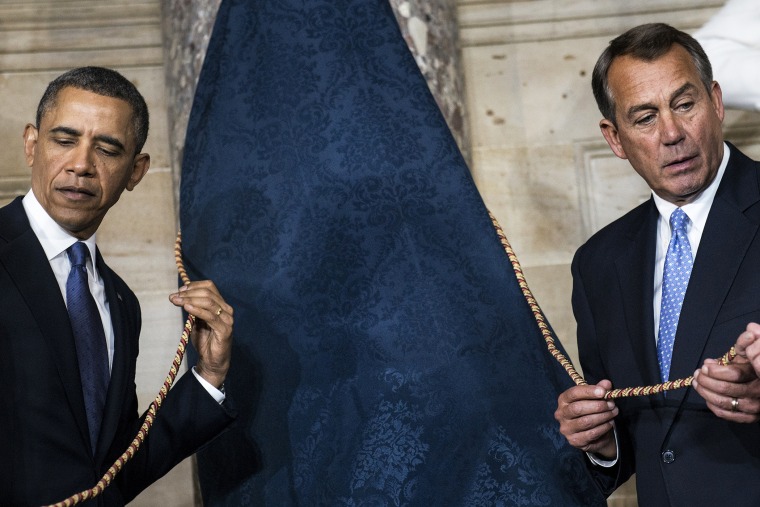House Speaker John Boehner’s lawsuit against President Obama might poison their ability to work together on bills. That is, if there were anything left for them to work on.
Although the current surge of unaccompanied Central American minors at the border may force Obama and Boehner to grudgingly work out a limited emergency spending bill, the few fleeting chances the pair had to find common ground on more significant legislation have all passed. Their shared interests in golf, cigarettes and pragmatism only went so far, leaving them poised to spend the rest of Obama's term bitterly sniping at each other in public rather than hammering out major bills in private.
At best, the two still share an interest in avoiding more self-inflicted disasters like another government shutdown, which could happen again over climate change regulations, or a prolonged debt ceiling standoff. In its own grotesque way, Boehner’s lawsuit might even be a nod to maintaining this fragile ceasefire. By suing Obama now over a health care dispute from last year, Boehner may be trying to head off impeachment demands from the conservative fringe.
The rare chances they had to work together on a true legacy achievement never seemed to pan out. The first opportunity was deficit reduction. After the 2010 elections, the new GOP House majority wanted to make good on its mandate to slash spending. Obama wanted to burnish his centrist credentials with a “grand bargain” that would have paired massive spending cuts with tax increases.
RELATED: Boehner: When will President Obama take responsibility?
It didn’t work out that way. Boehner withdrew from talks over the bigger deal amid fierce conservative opposition to new tax revenue, and he and the president transitioned to the more modest goal of raising the debt ceiling before they triggered a financial crisis. The deal they negotiated satisfied no one. The smaller cuts still put a drag on the recovery while entitlements like Medicare and Social Security, which Republicans wanted totally overhauled, were left intact. Disappointed tea party activists discovered that their leadership would cave if they came too close to the debt ceiling, something that would happen repeatedly in the coming years.
The deal did at least include the seeds of more bipartisan talks: a series of impending spending cuts known as the sequester which were designed to be so painful and awkwardly applied that they would force the two sides to reach a deal.
They didn’t. The cuts went into effect, further enraging both parties until Republicans eventually decided it was better just to claim them as a victory instead. With overall spending levels set and the health care law growing more entrenched by the day, Obama and Boehner's remaining spending skirmishes are more likely to be fought at the margins.
The 2012 elections brought more limited opportunities for cooperation -- all of which are now dead.
For a fleeting moment, it looked like there might be a chance to pass modest gun control measures after the December 2012 Newtown massacre before Second Amendment groups rallied. In retrospect, it was probably impossible, especially for Boehner’s conservative caucus.
Immigration, however, looked like the most promising chance for cooperation yet. Like deficit reduction, both Obama and Boehner had a clear political interest in reaching a deal. For the president, it would give him a signature legislative accomplishment and help pay back the Latino and Asian voters who supported him by huge margins over Mitt Romney. For Boehner, it would help repair the damage with the same voters, give him his own signature achievement to rebut complaints he of a do-nothing Congress, and energize the party’s pro-reform business wing, which was increasingly nervous about the tea party’s influence.
Instead, the debate only clarified that the tea party was in the driver’s seat. The Senate passed an immigration bill with a strong bipartisan majority in 2013 and polls consistently showed voters supported reform. But after a year of waffling, conservative opposition scared Boehner out of offering any significant legislation at all.
Other green shoots of bipartisanship withered as well. Days after the 2012 election and with the Bush tax cuts set to expire, Boehner suggested he’d be willing to accept more tax revenue if the administration worked out a broader tax reform package that lowered rates while cutting loopholes and deductions. It didn’t make it into the deal to preserve portions of the Bush tax cuts, but Boehner kept talking up the urgent need for tax reform and highlighted efforts by Ways and Means Committee chairman Dave Camp, a Michigan Republican, to draft a GOP plan.
In 2014, Camp released his plan. To many observers’ surprise, the proposal – which drew on Camp’s talks with Democratic Senator Max Baucus of Montana – looked like a promising model for a compromise. It kept tax revenues neutral (Obama still wanted to raise them), but avoided shifting the burden to working class families in part by imposing a new tax on banks. The White House had endorsed many of its individual components already. Was this unexpected offer the bipartisan moment Boehner and Obama had been waiting for?
It wasn’t. Republican lawmakers and Wall Street donors pounced on its finance tax and Boehner distanced himself from the plan. Camp announced shortly afterwards that he would retire at the end of his term. Baucus, his bipartisan ally on tax reform, had already left to become ambassador to China.
With no obvious jumping off points for further policy talks, Boehner and Obama have entered into what Talking Points Memo’s Josh Marshall described as a “long truce.” Obama focuses on enacting policy outside of Congress, Congress focuses on Benghazi and the IRS, and neither gets in each other’s way too much before someone else can take over their jobs.
